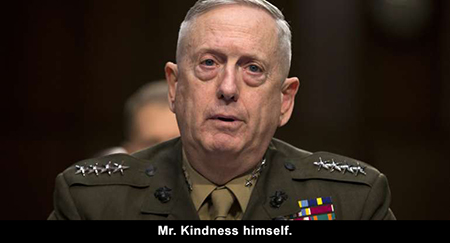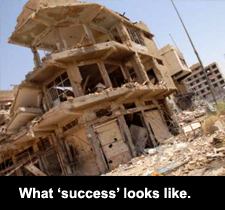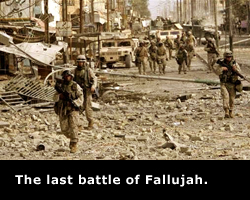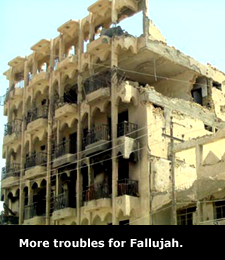Former secretary of defense under Donald Trump James Mattis has a book out, so he’s making the rounds of all the talk shows, talking about leadership, acting as though his reluctance to criticize the president is somehow rooted in personal integrity. What he won’t talk about on the book tour is how his “leadership” responded to policies that any person of average integrity would take issue with. Mattis sat still when Trump started banning Muslims from entering the country. He said nothing when Trump began separating children from their parents at our southern border and putting them in cages. He was silent as Trump praised white supremacists as “good people” in the wake of Charlottesville. When did he finally throw in the towel? When Trump decided to remove troops from Syria. That tells you much of what you need to know about Mattis.
Steve Inskeep’s fawning interview on NPR had few high points. Somehow Mattis saw fit to claim:
“From a Roman general, I used no better friend, no worse enemy. We were going in to liberate the Iraqi people from Saddam. We were not going in to dominate them. I didn’t want triumphalism. I wanted to go in with a sense of first do no harm.”
First do no harm? Seriously? He has a funny way of showing it. One of Mattis’s bragging points was always his pivotal role in the various battles of Fallujah, a bloody massacre in which the U.S. military’s first act was to commandeer the city hospital. It’s kind of ridiculous to refer to such operations as “battles”, when the enemy they are fighting are so outgunned. In any case, the Iraqi casualties in Fallujah were so high that the city was left out of the Johns Hopkins study of Iraqi deaths caused by the 2003 invasion because they felt it would skew the numbers. That study, first published in 2005 I believe, numbered Iraqi deaths at more than 500,000 as a result of the war. It was revised later to something like 650,000. Do no harm?

The example he gives of a young officer choosing not to shoot up a building in Baghdad in order to spare civilians sounds apocryphal in light of the stories that have come out of that war. Robert Fisk described the U.S. tank shell that destroyed the building that housed Reuters journalists, among others. That was more along the lines of common practice, frankly. The U.S. military doesn’t exactly walk around on tip-toe. How any senior commanding officer attached to this atrocity can have the gall to speak proudly about his humanity in the context of imperial war is beyond me.
Save your leadership lessons, mad dog. You lost all credibility the moment you signed on to the criminal enterprise that was the invasion and occupation of Iraq.
luv u,
jp

 Today, the Baghdad government is ripping Fallujah yet another new asshole. It’s worth recalling that the ISIS militants they are fighting in that unfortunate city are mostly disaffected Sunnis, the most senior of which were probably part of Saddam’s army, the younger ones simply kids with no future, like so many Gazans or West Bank Palestinians. Malcolm Nance reminds us that, prior to our 2003 invasion, there were no Al Qaida to speak of in Iraq; after the invasion, they numbered in the low thousands. It wasn’t until the utter failure of the post-invasion regime to incorporate Sunnis into society (and, yes, the arrest and disappearance of many at the hands of the Iraqi security forces) that these young people became fodder for opportunistic Salafi organizations like ISIS.
Today, the Baghdad government is ripping Fallujah yet another new asshole. It’s worth recalling that the ISIS militants they are fighting in that unfortunate city are mostly disaffected Sunnis, the most senior of which were probably part of Saddam’s army, the younger ones simply kids with no future, like so many Gazans or West Bank Palestinians. Malcolm Nance reminds us that, prior to our 2003 invasion, there were no Al Qaida to speak of in Iraq; after the invasion, they numbered in the low thousands. It wasn’t until the utter failure of the post-invasion regime to incorporate Sunnis into society (and, yes, the arrest and disappearance of many at the hands of the Iraqi security forces) that these young people became fodder for opportunistic Salafi organizations like ISIS.
 mortality rates in Fallujah have reached ridiculously high levels in the wake of the U.S. assault, very likely the result of our use of depleted uranium munitions. The casing materials from these armor-piercing shells caused untold misery in Iraq in the years following the Gulf War, during which time essential medical supplies were being withheld from them by virtue of U.S. /U.K. sanctions. (Cockburn’s colleague Robert Fisk tells the story in his book
mortality rates in Fallujah have reached ridiculously high levels in the wake of the U.S. assault, very likely the result of our use of depleted uranium munitions. The casing materials from these armor-piercing shells caused untold misery in Iraq in the years following the Gulf War, during which time essential medical supplies were being withheld from them by virtue of U.S. /U.K. sanctions. (Cockburn’s colleague Robert Fisk tells the story in his book